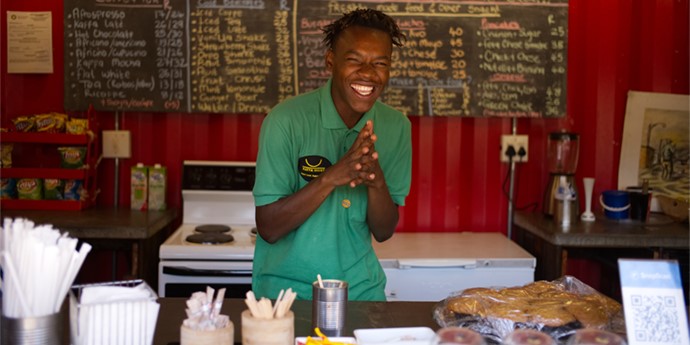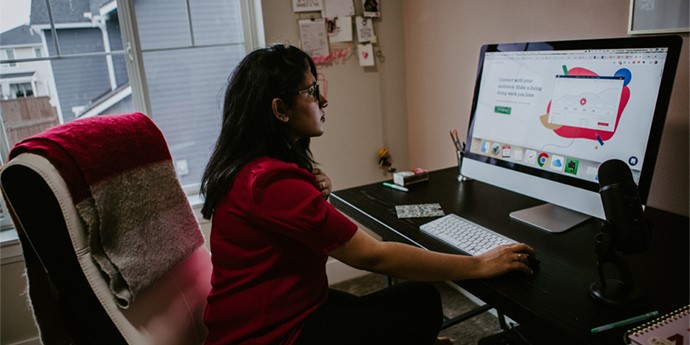The government has taken bold and admirable steps in providing financial support for small companies, but we’ll need all hands on deck to ensure small businesses make it through the COVID-19 crisis. The Bertha Centre’s Natasha Dinham spoke with Kieno Kammies at Cape Talk, about how investors can help small businesses through these challenging times.
Listen to the full interview here
Q: What are some of the things small businesses need to bear in mind when it comes to potentially surviving COVID-19?
A: This is such a critical time for businesses but it’s also an important time for the economy and society as a whole. We know that small businesses are the backbone of the economy. They’re creating jobs and empowering households and communities. What they need to focus on is how to get through the next three months, as overheads are high and cash flow is low. We’ve seen some businesses pivoting — you’ll have noticed some of your local food providers are now delivering, but overall it really is a tough time. The work we’re doing at the moment is looking at how businesses can engage with their investors to open up this conversation, because ultimately their approach over the next few months is going to determine whether or not they survive.
Q: Should businesses be looking at diversifying their income streams?
A: Absolutely. There’s never been a better time to pivot, and we are fortunate that we live in the age of technology where we have the resources and tools available to help us do that. But businesses really need to be focusing on their overall business model right now in any way they can, and investors play a key role in this. For a lot of businesses, pivoting completely at this point is just not an option. There’s a certain amount of innovation that they can use, but they are also going to need support from the people who are providing them finance.
Q: What should investors be doing to help small businesses?
A: There are lots of tools for financial providers to enable them to help businesses get through this time, both in terms of the finance they’re providing but also in terms of the non-financial resources they have. These tools can be deployed to help connect businesses to sources of funding that are available, to other networks and markets that they perhaps hadn’t thought of, and to mentor them through this time — bringing in an external voice that provides resources that businesses otherwise wouldn’t have access to.
But picking the right investor is critical. At a time like this, if you’re looking for new funding, having good alignment up front is crucial. Businesses should particularly look at what investors can provide beyond just financial support. What we’ve seen some investors do during the COVID-19 crisis is walk their portfolio companies through the process of applying for some of the government and other private resources that are available. It’s fantastic that government has made funding available, but if you’re a small business, it’s a minefield of information. It can be really overwhelming. While this may seem like a very small thing that investors are doing, just walking companies through that process, this alone has enormous value for small businesses.
Q: Isn’t this something all service providers, particularly banks, should be offering? Wouldn’t it be in their interest to help the businesses on their books to innovate and leverage the huge network of people that bank with them?
A: At the end of the day, big corporates have a lot more resources than small businesses that they can tap into. They have innovation departments for instance, that can help companies innovate and pivot, because at this point, time really is of the essence. There aren’t long lead times; businesses have to move rapidly. Investors have the power to provide support on the non-financial side, and if you combine this with a bridging loan or a payment holiday, that’s an incredibly powerful solution.
Q: At UCT there’s a big drive toward design thinking. What role does that play in helping businesses to come up with innovative solutions at this time?
A: That’s the key thing. Solutions cannot be one-size-fits-all, especially when it comes to small businesses and innovating. This is why, at the GSB, we rely a lot on design thinking methodology, because it has to be bespoke. It has to be targeted to that particular business’s needs.
But this does present a challenge. On the one hand, solutions have to be quick, but on the other hand, they have to set businesses up for not just the lockdown period, but for the next three to six months, and potentially even the next three years. As we go along, we are realising this is not going to be over any time soon. So although solutions need to be found quickly to relieve that cash flow in the short-term, they also need to be sustainable solutions that can run over the long term.
This is an edited transcript of an interview which was aired on Cape Talk on 6 April 2020




































